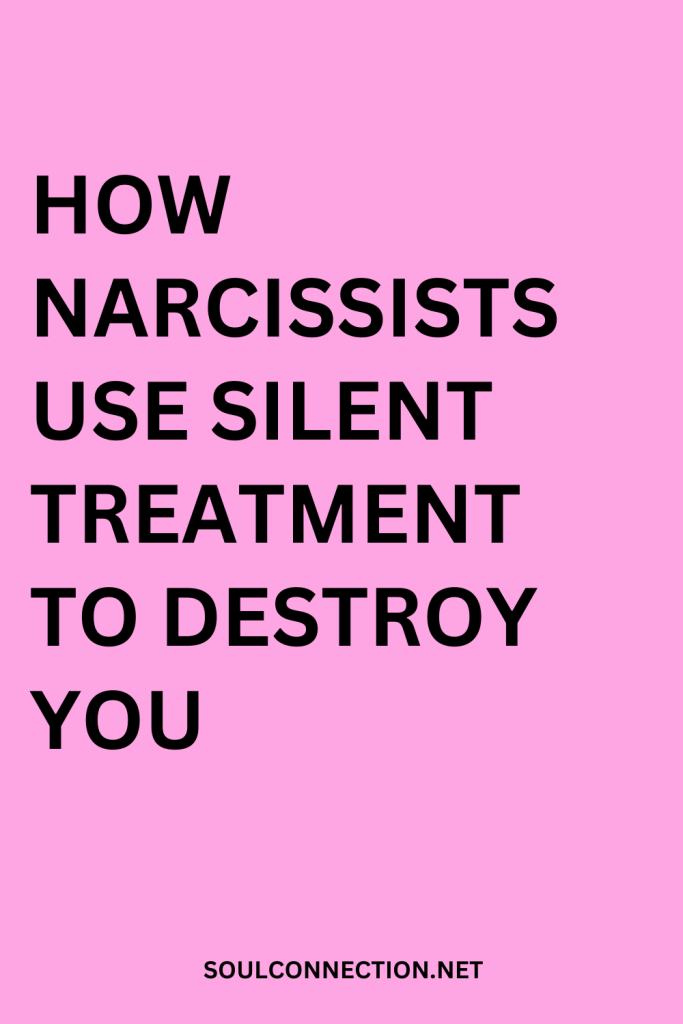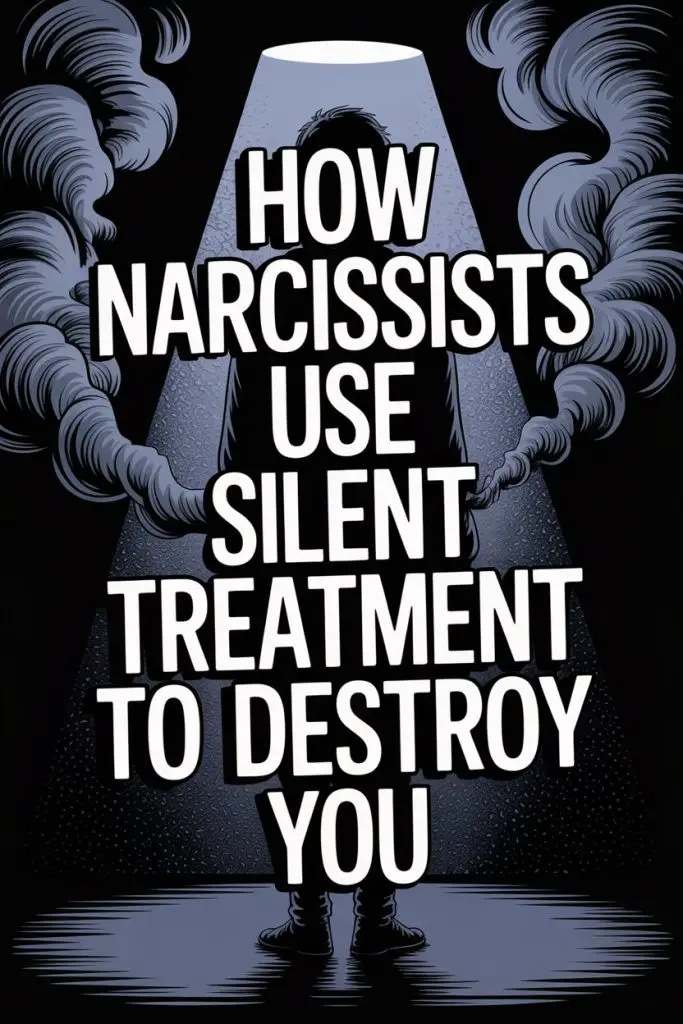It starts quietly. No shouting, no flying plates, not even a snide comment tossed across the room. Just… nothing.
Silence. As if you’ve become invisible in your own kitchen, waving hello to a wall.
That’s the magic trick of the narcissist’s silent treatment. And trust me, it’s not the kind of magic you want to see twice.
After all, who needs words when you can wage psychological warfare with a well-timed, icy shrug?
The Quietest Power Play in Town
Nothing says “I care” like pretending you don’t exist. The silent treatment isn’t just someone needing a breather. This is strategy.
Narcissists wield it like a sharpened spatula, flipping the whole relationship dynamic in their favor.
By withholding conversation, basic courtesies, or even eye contact, they create a void. A void you’ll desperately scramble to fill.
Suddenly, you’re apologizing for things you didn’t do, just to banish that chill from the air. Spoiler: it rarely works.
The Science of Silence
Neuroscience confirms what your gut already knows—social rejection feels like a punch to the brain. Even mild ostracism triggers pain pathways similar to physical injury.
Narcissists may not know the neurology, but they’re experts at watching you squirm.
The longer the silence continues, the more you start doubting yourself. Did you say the wrong thing? Was your “good morning” too cheerful? Maybe you shouldn’t have breathed so loudly.
This is exactly where the narcissist wants you: stuck in the quicksand of self-blame.
Control in a Whisper
Silent treatment hands all the power to one person. The narcissist controls when the freeze starts and ends. Apologies, explanations—nothing cracks the ice until they decide it’s time to thaw.
It’s emotional blackmail, only less dramatic and far less honest.
This isn’t a disagreement. It’s a game. One rule: you lose, they win. The more you flail for connection, the higher their sense of control climbs.
The Narcissist’s Playbook
Masters of drama, narcissists don’t pull out the silent treatment at random. It’s usually triggered by something—maybe you questioned them, set a boundary, or failed to admire their impressive towel folding techniques.
They feel slighted, so they reach for their favorite punishment.
Sometimes, the silence lands out of nowhere, with no warning or visible cause. Just another Tuesday! This unpredictability keeps you on edge, waiting for the next communication blackout.
Gaslight Special
Just in case the cold shoulder wasn’t enough, narcissists love to sprinkle in some gaslighting.
When you eventually ask, “Why aren’t you speaking to me?” they might reply, “I’m not upset. I just don’t have anything to say.” Or, “You’re imagining things. You’re too sensitive.”
Cue the confusion. The longer this cycle runs, the more you start doubting your own reality.
Is it really that bad, or are you losing the plot? Welcome to the funhouse mirror version of your relationship.
The Impact on You
Enduring the silent treatment from a narcissist isn’t just unpleasant. It’s corrosive. Repeated exposure undermines your self-esteem, making you question your worth and sanity.
If someone treats you like a ghost long enough, you start to disappear on the inside.
Many people report anxiety, chronic stress, and even physical symptoms—headaches, stomach pain, sleepless nights—after repeated silent spells. Emotional neglect might not leave bruises, but it packs a punch all the same.
Why Does It Hurt So Much?
Humans are wired for connection. When that connection is yanked away on purpose, it hurts. The pain isn’t weakness or neediness; it’s biology.
Narcissists count on your desire to repair the bond, using it as leverage.
The more you chase their attention, the more power they have. The silent treatment isn’t just about ignoring you—it’s about making you dance for the privilege of their company.
Breaking the Spell
If you’re stuck on the receiving end of this chilly ritual, here’s the uncomfortable truth: you can’t make a narcissist communicate with kindness. But you can starve the behavior of its favorite fuel—your desperate attempts to fix everything.
Instead of chasing, take a step back. Give the silence right back to them. Go about your business. Practice gray rock technique—be boring, unresponsive, as neutral as a shopping list.
The less reaction you offer, the less satisfying their control trip becomes.
Set Boundaries Without Apology
Boundaries are your best defense. If the silent treatment drags on, call it out—calmly, directly, and once. Try: “I notice you’re not talking. I’m ready to speak when you are.” Then move on.
Don’t beg, plead, or launch into an interpretive dance of reconciliation. You’re not auditioning for a part in their drama. You’re just not playing.
What Not to Do
No matter how tempting, don’t grovel for forgiveness when you’re not at fault. Apologizing for imaginary crimes only teaches the narcissist that their tactic works.
Likewise, don’t try to out-silent them in a game of mutual ignoring—this can quickly devolve into a contest nobody wins.
And if you catch yourself rationalizing their behavior (“They’re just stressed,” “I probably overreacted”), pause. Notice how the responsibility keeps shifting onto you. That’s not by accident.
Getting Support
Isolation makes the silent treatment worse. Reconnect with your support network—friends, family, a therapist, or anyone who doesn’t use silence as a weapon.
Sometimes, just talking through the experience helps crack the spell.
Jot down what’s happening. Keeping a record can clarify just how often the pattern repeats, and how it makes you feel.
Evidence is handy—not just for your sanity, but in case you ever need to explain the situation to someone else.
When Enough Is Enough
If silent treatment is a one-time blip during an argument, maybe chalk it up to human imperfection.
If it’s a recurring theme, or part of a wider pattern of emotional abuse, it’s time to ask the big question: what are you getting out of this relationship?
Long-term exposure to this treatment erodes mental health, confidence, and joy. Nobody deserves to tiptoe through their own home, wondering when communication will be switched off again.
The Road to Recovery
Leaving or detaching from a narcissist is rarely easy. They’re experts at hoovering—yanking you back the moment you pull away. But restoring your self-worth starts with recognizing these toxic patterns, and refusing to play along.
Lean into your own voice. Reclaim your right to be heard, respected, and yes—even spoken to like a real human being. That’s not asking too much.
Reclaiming Your Sanity
The silent treatment isn’t just a quirk; it’s a power move with a high emotional cost. Seeing it for what it is strips it of some of its sting.
Nobody deserves to be frozen out for sport. If you’re caught in the chill, remember: your worth isn’t measured by someone’s willingness to talk to you.
Sometimes, the most radical act of self-care is listening to the silence—and choosing not to let it define you.


